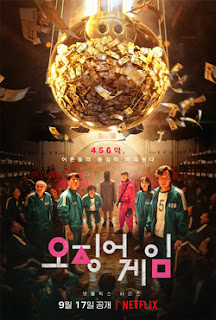Ojing-eo Geim; mystery thriller survival series, South Korea, 2021; D: Hwang Dong-hyuk, S: Lee Jung-jae, Park Hae-soo, Wi Ha-joon, Jung Ho-yeon, O Yeong-su, Heo Sung-tae, Anupam Tripathi
After winning money at a horse bet, but having it stolen by a pickpocket, Seong Gi-hun has had it: in order to pay off his huge debt to the loan sharks, he accepts the offer of a shady man to enlist in a mysterious tournament game on a remote island. The prize: 45.6 billion won. He is given the number 456, being the last of the over 400 participants. He meets other players there: Sang-woo, whose firm went bankrupt and is sought by the police; Sae-byeok, a North Korean defector; an old man suffering from brain tumor; Deok-su, a bully; Ali, a Pakistani immigrant... The games are various, but the losers always lose their lives: Red Light, Green Light; having to carve up a triangle, circle or an umbrella from a cookie; two teams pulling a rope over a high altitude; walking over a bridge made out of solid or fragile glass platforms... The games are played to entertain spoiled rich people wearing masks. In the end, only Gi-hun and Sang-woo survive to the finale, the squid game. However, Gi-hun refuses to win and wants to cancel the game, but Sang-woo commits suicide, making Gi-hun the winner by default. Back on the streets, he meets the old man again, who admits of being one of the rich people who orchestrated the games for fun. The old man dies, while Gi-hun contemplates to take revenge on the game hosts.
Netflix’s most watched TV series at that time, “Squid Game” is a Korean variation of “Rollerball”, “The Running Man”, “The Prize of Peril” and other dystopian survival films from the 70s and 80s that predicted how the very powerful may one day get so bored that the only thing that amuses them is to watch people playing games for life or death, as some sort of modern deterioration back to the mindset of the Gladiator games. “Squid Game” is a giant dark allegory on capitalism, showing how poor people would do the strangest things just to get money from rich people in charge. Even greed outside games is rewarded, obvious in an episode when a bully beats up a man to death, which just increases the reward money, since there are now fewer contestants. In episode 2, the contestants vote to leave such a brutal game tournament, since over 200 of them were shot in the first round, but that is tantamount to quitting a job—they are free, but back on the streets in debt, and thus decide to return “back to work” to get money. The message of inequality and the clash between the upper and lower class is shaped far better here than in Bong’s clumsily written social issue film “Parasite”.
“Squid Game” is also an allegory on integrity, presented in the honest hero, and on power, depicting a strange dictatorship of the spoiled tycoons who perversly watch these bloody games for entertainment, because they feel they have superior power over others. This series is strange and hermetic at first, but it is a world which is so addictive that once you enter it and see only 2-3 episodes, you have to see it to the end. The writing is rather conventional, since the dialogue is standard, and it is not that suitable for repeated viewings once you have seen it, losing its surprise factor, yet it is suspenseful when you watch it for the first time. The characters are mostly archetypes, nameless players reduced to numbers, but are sufficiently modeled to recognize them: from the religious fanatic who thinks God will save him; through the immigrant who wants to stay polite and kind in this rough game of competition; up to the bully whose brute selfishness knows no limits (and is thus immediately set-up for the viewers to cheer for his fall). Sadly, the last two episodes are underwhelming, ending on an anticlimactic note—yet the high impression was still achieved previously, confirming Korea's pop-culture "new wave" in the early 21st century.
Grade:+++





No comments:
Post a Comment